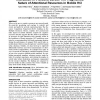Free Online Productivity Tools
i2Speak
i2Symbol
i2OCR
iTex2Img
iWeb2Print
iWeb2Shot
i2Type
iPdf2Split
iPdf2Merge
i2Bopomofo
i2Arabic
i2Style
i2Image
i2PDF
iLatex2Rtf
Sci2ools
CHI
2005
ACM
2005
ACM
Interaction in 4-second bursts: the fragmented nature of attentional resources in mobile HCI
When on the move, cognitive resources are reserved partly for passively monitoring and reacting to contexts and events, and partly for actively constructing them. The Resource Competition Framework (RCF), building on the Multiple Resources Theory, explains how psychosocial tasks typical of mobile situations compete for cognitive resources and then suggests that this leads to the depletion of resources for task interaction and eventually results in the breakdown of fluent interaction. RCF predictions were tested in a semi-naturalistic field study measuring attention during the performance of assigned Web search tasks on mobile phone while moving through nine varied but typical urban situations. Notably, we discovered up to eight-fold differentials between micro-level measurements of attentional resource fragmentation, for example from spans of over 16 seconds in a laboratory condition dropping to bursts of just a few seconds in difficult mobile situations. By calibrating perceptual sam...
CHI 2005 | Difficult Mobile Situations | Human Computer Interaction | Typical Urban Situations | Web Search Tasks |
| Added | 30 Nov 2009 |
| Updated | 30 Nov 2009 |
| Type | Conference |
| Year | 2005 |
| Where | CHI |
| Authors | Antti Oulasvirta, Sakari Tamminen, Virpi Roto, Jaana Kuorelahti |
Comments (0)

